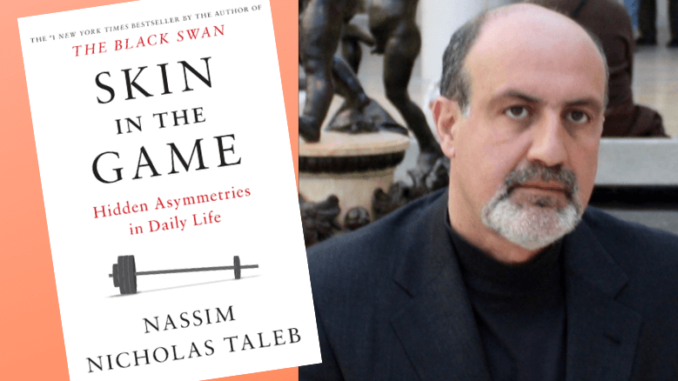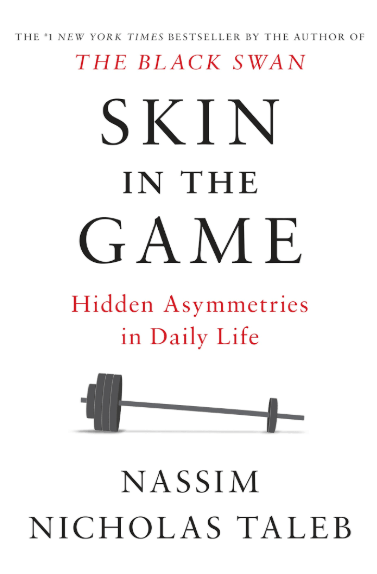
Happy New Year, 2019!
It’s been two months since I published anything on this blog. So I’ve decided to make it my New Year’s Resolution to blog every day…
Let’s see how far I get.
Tonight I’m going to offer a review of Skin in the Game, by Nassim Nicholas Taleb, or at least, a few comments about my impressions of it so far.
Skin in the Game, by Nassim Nicholas Taleb
I ended 2018 listening to the Audible version of Skin in the Game by Nassim Nicholas Taleb.
I picked it up as one of a 2-for-1 Audible year-end credit deal a couple of days ago.
Taleb has been on my radar for a while, but this was an impulse purchase – and a happy one too.
It’s one of those reads – or listens – where you find yourself saying, “Yes! Yes! Yes!” as you are grabbed by the vividness of the prose and, dare I say it, a new clarity in your thinking seems to emerge.
That is in part because Taleb has a very readable style. Although he’s dealing with a complex subject he is a good raconteur.
So what is Skin in the Game all about?
The basic argument is that people who make offers, sell stuff, engage in politics, and who expect to benefit from a “gain” – or win – should also be exposed to the consequences of a “loss,” and not just the customer or client.
Think of the financiers who bailed out of the financial crash with golden parachutes and who had no skin in the game.
You have “skin in the game” when you are fully committed to what you are engaged in, and are willing to take on the risk as well as to enjoy the reward. Having skin in the game keeps you symmetrical.
Reading Skin in the Game is helping me to get clarity over a few things. Some of those “Yes” moments include:
- . Why I prefer a pragmatic, local, approach to the glib aphorisms of universalism; Burke rather than Paine, although, to his credit, Paine himself had skin in the game and the American revolution is one of the few revolutionary success stories. (The other that comes to mind would be the San Domingo Revolution as described in The Black Jacobins by C. L. R. James.)
- Why it is correct to loath both Tony Blair and David Cameron; two “interventionista” poseurs with no skin in the game:
So we tried that thing called regime change in Iraq, and failed miserably. We tried that thing again in Libya, and there are now active slave markets in the place. But we satisfied the objective of “removing a dictator.” By the exact same reasoning, a doctor would inject a patient with “moderate” cancer cells to improve his cholesterol numbers, and proudly claim victory after the patient is dead, particularly if the postmortem shows remarkable cholesterol readings.
Skin in the Game, p. 22
- Why silver beats gold when it comes to rules of behaviour. Taleb doesn’t mention him, but the silver rule was also codified by Confucius in the Analects:
其恕乎。己所不欲,勿施於人 : Reciprocity. What you don’t want yourself, don’t inflict on others. (A slightly modified version of Pound’s translation.)
Analects 15:24
Taleb argues that the silver rule is more “robust” because,
it tells you to mind your own business and not decide what is “good” for others. We know with much more clarity what is bad than what is good.
Skin in the Game, p. 33
The First Amendment of the U. S. constitution seeks to establish a “silver rule-style symmetry” of freedoms. This leads to a crucial point of clarity in opposition to the current identitarian mania:
Effectively, there is no democracy without such an unconditional symmetry in the rights to express yourself, and the gravest threat is the slippery slope in the attempts to limit speech on grounds that some of it may hurt some people’s feelings. Such restrictions do not necessarily come from the state itself, rather from the forceful establishment of an intellectual monoculture by an overactive thought police in the media and cultural life.
ibid, p. 35
Notice how the enemy is once again a form of universalism – the imposition of an intellectual monoculture often by ideologues in the media and academia who more often than not have no skin in the game.
For a more detailed discussion of these and other issues discussed by Taleb, check out this podcast by Random Talkers, as I’m about to go to bed and want to mention a couple more thing before I go:
#1 IYI: The Modern Intellectual
Taleb refers to intellectuals as IYIs. IYI stands for “Intellectual Yet Idiot.” An IYI is one who, for example, thinks
people should act according to their best interests and he knows their interests, particularly if they are “rednecks” or from the English non-crisp-vowel class who voted for Brexit.
ibid, p. 150
Elsewhere Talib has spoken of the EU as a “metastatic and rather incompetent bureaucracy” that is too intrusive and bound to fail. Yes! (Mind you, the EU does have nice “travel privileges.”)
#2 The IYI As Top-Down “Fixer”
A few years ago at a certain college where I teach part time here in Hiroshima, a new dynamic president was brought in to bring about “change.” She laid out a marvellous set of massively complex plans that proved disastrous.
She was, I don’t doubt, handsomely paid off, and disappeared to perform another reconstruction job on some other God-forsaken institution. Apparently that was her “thing” – and her thing had no skin in the game:
a bureaucratized system will increase in complication from the interventionism of people who sell complicated solutions because that’s what their position and training invite them to do.
ibid, p. 44
Yes!
#3 Taleb Even Lifts Weights
Yes! This is what I advise anybody who listens to me to do. I even do a bit of it myself sometimes. Forget jogging. Walk, run in short bursts, and lift weights.
#4 The Tinkerer Versus Plato
Just like his hero Karl Popper, Taleb is hostile to what he sees as the Platonic tendency to create patterns and mistake them for reality.
In The Black Swan Taleb refers to this as “Platonicity.” He writes:
Platonicity is what makes us think that we understand more than we actually do. But this does not happen everywhere.
https://www.ft.com/content/26345fa6-7d67-11dc-9f47-0000779fd2ac
There follows an important qualification:
I am not saying that Platonic forms don’t exist. Models and constructions are not always wrong; they are wrong only in some specific places. The difficulty is that a) you do not know where beforehand (only after the fact), and b) the mistakes can lead to severe consequences. These models are like potentially helpful medicines that carry random but very severe side effects.
https://www.ft.com/content/26345fa6-7d67-11dc-9f47-0000779fd2ac
What Taleb seems to be advocating is an heuristic approach to the real world. “Platonicity” is not so much an attack on Platonic philosophy as on the misplaced reliance on algorithmic reasoning in uncertain situations.
I mention this as my own perspective is one that cuts across what I see as the “default” setting of the typical intellectual type today, at least in the Anglo-Saxon world.
The “typical intellectual type” (not necessarily an IYI) has a double default setting of philosophical materialism (realism) and political idealism (utopianism).
My own default setting, however is precisely the opposite: philosophical idealism and political realism; Plato and Machiavelli, Ficino and Burke; but also the “tinkering” heuristics of Bacon and the stoicism of Seneca. From this you can imagine how I would be likely to appreciate much of what Taleb has to say on the Machiavellian/realist side of the argument. Keep universalistic idealism out of politics; and reductive materialism out of philosophy.
Be that as it may, these comments are almost certainly a misrepresentation and distortion of Taleb’s Skin in the Game and his other ideas. Indeed, I doubt that I have much skin in the game if, on reading these comments you buy his book and are disappointed.

